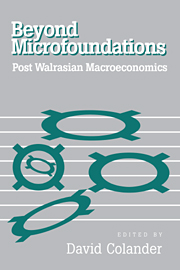Book contents
- Frontmatter
- Contents
- About the authors
- Preface
- 1 Overview
- I The Post Walrasian macroeconomic vision
- 2 Taking markets seriously: groundwork for a Post Walrasian macroeconomics
- 3 Towards a not-too-rational macroeconomics
- 4 The macrofoundations of micro
- II The underpinnings of Post Walrasian macroeconomics
- III Modeling a Post Walrasian economy
- IV New structuralist macroeconomics vs. Post Walrasian macroeconomics
- IV Appendix: Literature Survey
- Name Index
- Subject Index
3 - Towards a not-too-rational macroeconomics
Published online by Cambridge University Press: 05 June 2012
- Frontmatter
- Contents
- About the authors
- Preface
- 1 Overview
- I The Post Walrasian macroeconomic vision
- 2 Taking markets seriously: groundwork for a Post Walrasian macroeconomics
- 3 Towards a not-too-rational macroeconomics
- 4 The macrofoundations of micro
- II The underpinnings of Post Walrasian macroeconomics
- III Modeling a Post Walrasian economy
- IV New structuralist macroeconomics vs. Post Walrasian macroeconomics
- IV Appendix: Literature Survey
- Name Index
- Subject Index
Summary
Computable economics
At UCLA we are establishing a Center for Computable Economics. I have been very much involved in this effort This may surprise you. That a non-mathematical macro/monetary economist should become an enthusiast for this project is one of those things that “do not compute.” But then, as I will explain, we take a special interest in things that do not compute.
One may come to computable economics by many intellectual routes. I will trace my own, not because it makes a particularly edifying story, but because it will tell you what kind of problems I hope we can make progress on by developing the field of computable economics. But before we get to that, I had better explain what I mean by computable economics.
The computer is now being used in a wide variety of fields to model and to explore the properties of complex dynamic systems. We believe that this approach has a big potential payoff also in economics.
In macroeconomics, to take an example close to my heart, the last 10 or 15 years have seen the almost total abandonment of static in favor of dynamic models. Dynamical systems, however, have to have a very simple structure if one is to obtain closed form solutions. The core of this modern macroliterature consists of representative agent (or social planner) models, where the motion of the entire system is given by the solution to a single optimization problem.
- Type
- Chapter
- Information
- Beyond MicrofoundationsPost Walrasian Economics, pp. 39 - 56Publisher: Cambridge University PressPrint publication year: 1996
- 5
- Cited by



